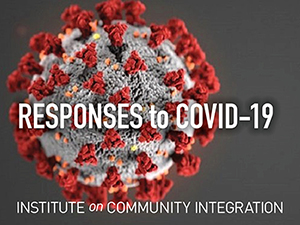In Crisis, MN UCEDD/LEND Responds
May 18, 2020

|
Responding to the COVID-19 pandemic, researchers and training specialists at the Institute on Community Integration (MN UCEDD/LEND) are launching several new ventures aimed at supporting people with disabilities through the crisis.
Among other initiatives, ICI's TIES Center is offering free distance-learning content on its website for teachers and parents who support students with the most significant cognitive disabilities as they manage schoolwork online.
"It's been gratifying to see our investigators and trainers throughout ICI stepping up to support people with disabilities, families, teachers, and direct support professionals through this difficult time," said Amy Hewitt, ICI's executive director. "All of this work underscores our primary mission, whether in good times or crises, to fight for the rights and full inclusion of people with disabilities."
The TIES Center has launched a distance-learning series that provides a framework for students with the most significant cognitive disabilities to get through these new transitions, engage fully in academics online, and interact with their teachers and peers, a critical component of well-being. The Center provides technical assistance for state and local education systems for increasing the time, instructional effectiveness, and engagement of students with the most significant cognitive disabilities as members of inclusive general education classrooms.
"When schools first started closing, we were noticing a lot of people hunting for and clicking through a morass of data, trying to make sense of it and apply it. We wanted to provide something that spoke to the most important, and challenging, aspect of this situation, which is to maintain students' engagement with the general educational curriculum and their classmates," said Terri Vandercook, one of several authors of the series. "We're trying to, each week, offer practical illustrations for engaging students."
ICI's National Center on Educational Outcomes (NCEO) is acting as a resource information hub on how student testing and other assessments will be impacted by the pandemic, said NCEO's Director, Sheryl Lazarus.
"The federal government is allowing states to request a waiver from federal testing requirements this year, and most (if not all) states have requested waivers, which has led to many technical assistance needs and questions," said Lazarus. "Some states had already begun administering alternative assessments for students with the most significant cognitive disabilities, so we are helping them with questions about the appropriate use and dissemination of partial results. Some states and districts are also considering administering interim assessments to measure student learning during this period of distance education, and we're getting questions about accessibility and accommodations for students with disabilities, English learners, and English learners with disabilities on these assessments."
ICI is also collaborating with government and community partners on a variety of initiatives, including working with the Minnesota Department of Human Services to provide a COVID-19 related person-centered and positive behavior supports resources page.
ICI staff have offered numerous interviews and data to the media and government officials on the impact of COVID-19 on people with intellectual and developmental disabilities as well as the direct support professionals (DSPs) who provide them with supports. The American Network of Community Options and Resources and ICI are offering free access to a realistic job preview video for DSPs (password: #RJP2020) for a limited time during the staffing disruption caused by COVID-19.
In collaboration with the National Alliance for Direct Support Professionals, ICI is gathering stories from DSPs about how the supports they deliver have changed as the shelter-in-home orders have evolved.
"This workforce is invaluable, yet unrecognized by far too many people in our communities. We are fighting for states and the federal government to recognize them as essential workers," Hewitt said. If you know someone whose job is supporting people with disabilities, please encourage them to share their story online.
Investigators also are working with the University of Minnesota's Institutional Review Board to modify research protocols to allow for virtual interviews and changing some research questions to capture timely information about how COVID-19 is changing lives.
Within ICI's Community Living and Employment area, for example, researchers are seeking to modify an ongoing study of employment consultants to learn how COVID-19 has affected workers with disabilities, whether they or the workers are considered essential employees, and how employers could better support workers with disabilities during crises.
"We're not only thinking about new research questions, but also about how to best conduct human-subjects research in this new environment," said Kelly Nye-Lengerman, an ICI research associate.
Taken together, the efforts demonstrate ICI's resolve to continue its research and outreach, Hewitt said.
"When we can't be in the community with people, our research is put on hold," she said. "For a research center, this is a significant change of course, so it's important to adapt."







